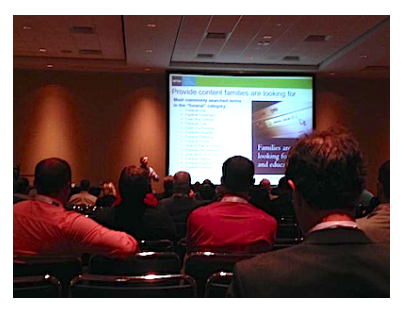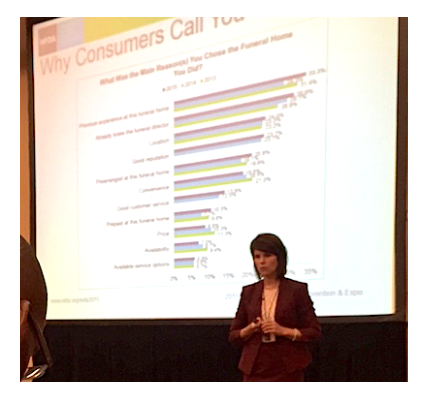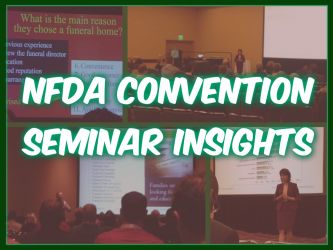Nov 05, 2015
“Reinventing”
“New perspectives”
“Next stage”
“The Future”
“Disrupt the paradigm”
“Relevant”
When glancing at this list of words and phrases, one might conclude they are all describing a major change or shift in thinking. However, in addition to conjuring futuristic images, these words also share one very important thing in common. They were all used in titles for different NFDA seminars and workshops at the 2015 Convention in Indianapolis.
The central theme at this year’s largest gathering of funeral directors in the world focused on paying tribute to the past of funeral service while looking ahead to the latest advancements in our profession. Seminars that focused on progressive ideas such as achieving organic growth, leveraging technology and using social media dominated this year’s lineup of educational sessions. Every year, the ASD team takes time to attend these sessions to hear different perspectives from convention speakers.
Here are 7 Valuable Insights We Learned From the 2015 NFDA Convention Seminars
1. Convey the Value of Funeral Service to Families
One of the most important issues addressed time and again during this year’s convention was the importance of communicating the value of the funeral experience to grieving families. This topic was the focal point during Christine Pepper’s address to NFDA Members during Opening General session.
“Earlier this year, NFDA conducted a member survey and we asked them to identify the biggest challenge they face when meeting with families to plan a funeral,” Pepper said. “The number one issue, identified by over 73 percent of respondents, was explaining the value of a funeral. In a world where some people no longer recognize the value of honoring their loved one through a funeral or celebration of life, it is our responsibility to reintroduce our families to those traditions and values.”
Pepper’s comments were echoed during Erin Whittaker’s presentation, “Funeral Directors Are Poor Businesspeople: Perception, Reality or Opportunity to Disrupt the Paradigm?” Whittaker explained that the purpose of a funeral is to capture the story of a person’s life and share it so loved ones know an important life was lived. She emphasized how essential it was for directors to be able to articulate this intangible benefit to families. Whitaker recommended directors take time to write down ten ways their funeral home is different than other firms and then put those ten reasons into paragraph form. Having a clearly defined mission statement that conveys the value of funeral service and memorialization will help directors to better assist at-need families.
2. Leverage Technology Throughout the Funeral Process 
Mike Bryan’s session, “Using Technology to Work Smarter and Increase Family Satisfaction” provided many persuasive reasons why funeral homes must adopt technology as part of their business strategy. Bryan began his session by showing a compelling video that showed many eye-opening statistics about the growth of technology. (For instance, did you know the number of text messages sent and received on any given day is twice as much as the world population?) He then shared some surprising numbers about the technical experience of the funeral profession as a whole. While only 50% of funeral homes use technology to run their business, 80% recognize it is important.
“Because you’re in the business of serving people, it is essential to change along with them in order to continue serving their needs,” Bryan explained. He then detailed how funeral directors can search for opportunities to utilize technology through every stage of the funeral process. From handling the first call to setting up the arrangement conference to coordinating the service details, there are ways to streamline tasks through effective use of technology. Bryan suggested directors take a close look at every step of the process and seek out solutions that can reduce errors, eliminate duplicate data entry and exceed customer expectations.
3. Support Families Through Aftercare Programs
During her dynamic presentation, Erin Whittaker offered several examples of ways funeral homes could achieve organic growth. One of the methods Whittaker recommended was investing in an aftercare program and getting involved with community outreach. The NFDA’s 2015 Consumer Awareness and Preferences Survey found that the number one reason consumers chose a funeral home was based on previous experience. Whittaker discussed how directors must maintain relationships with families served in the past in order to continue serving these families in the future.
“Grief is not a moment in time, it is a journey so we must continue to support families,” Whittaker said.
4. Embrace Social Media
Both Bryan and Whittaker encouraged funeral directors to create a social media strategy for their firm, and they weren’t the only ones: many of the topics at this year’s NFDA Convention centered on this topic. In his presentation, Bryan explained that while social media does not cost anything, it delivers many benefits to funeral homes. Whittaker echoed this statement by listing social media as a method for achieving organic growth through self-promotion. She suggested directors take a look at successful social media pages as examples for their own.
One of the seminars at this year’s convention devoted to social media was presented by William Spear of Hansen-Spear Funeral Home. In his presentation, “Effective Social Media for Your Funeral Home on a Shoestring Budget,” Spear gave several examples of engaging content for funeral home social media sites. He recommended directors “give people a way to relate outside of death, grief and funerals” by sharing content that showcases personality. Recipes, photos of pets, and music lists are a few examples Spear listed as possible social media posts for funeral homes.
 5. Build Your ‘Dream Team’
5. Build Your ‘Dream Team’
Another valuable insight Whittaker provided when discussing organic growth was the importance of empowering the funeral home staff. Whittaker illustrated how every person brings a different strength to the table and you have to recognize what individual skills each employee offers in order to build your “dream team.”
“Some of us are natural funeral directors and not natural business people. Some of us are good with marketing but not so good with finance,” Whittaker stated. “You have to let your staff represent you. No one person does it all.”
6. Use Integrated Solutions to Monitor Business Performance
Both Bryan and Whittaker emphasized how crucial it is for funeral home owners to remain vigilant of their funeral home’s overall performance. Whittaker advised directors to pay close attention to their funeral home’s EBITA (Earnings Before Interest, Taxes and Amortization). This can help owners to easily measure their profitability. Whittaker stressed that directors should examine their overhead costs, rather than what their competition is doing, when determining their firm’s pricing.
“The future is integrated solutions so that you can review your business numbers in real-time,” Bryan stated during his seminar. He suggested directors seek out comprehensive technology tools that can be synced or integrated for easy data entry and management. By implementing performance-tracking tools that can be easily added to the funeral home’s existing strategy, directors will be better prepared to make projections about their business and meet future challenges.
7. Challenge Previous Perceptions
One of the comments reiterated many times during this year’s convention was how critical it was for funeral directors to embrace change. Chip Eichelberger’s keynote address “Get Switched On” focused heavily on how directors can realign their goals if they are not afraid to adjust their daily routine and thinking patterns. In his engaging seminar, Bryan provided concrete evidence of the many ways technology has altered how business is done in today’s society. He reasoned that directors must be cognizant of how their consumer’s behaviors have shifted as a result of technology in order to meet the needs of today’s families.
Whittaker named Kodak as an example of what happens to a company when it ignores advancements in technology and new ideas. She recommended directors have the “courage to listen to their customers” about ways they can stay relevant. “Funeral directors have to open to failure and open to trying new things,” Whittaker affirmed. “Changing conditions require different strategies and we know funeral service is changing.”
What were your favorite sessions and speakers at the NFDA Convention? Leave a comment below and share with us what tips you picked up in Indy this year!
About The Author
Jess Farren (Fowler)
Jess Farren (Fowler) is a Public Relations Specialist and Staff Writer who has been a part of the ASD team since 2003. Jess manages ASD’s company blog and has been published in several funeral trade magazines. She has written articles on a variety of subjects including communication, business planning, technology, marketing and funeral trends. You can contact Jess directly at Jess@myASD.com


